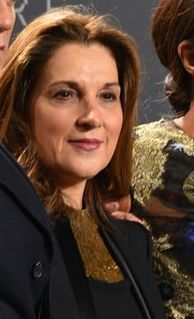A Quote by Alejandro Gonzalez Inarritu
The actors make the film. They're the ones that take this theoretical movie that's in your head and make it real. The success of a film is entirely on their shoulders. I admire them, because acting is such a difficult thing to do, and I personally can't understand it.
Related Quotes
I would make a huge distinction between theater improvisation and film improvisation. There isn't much improvisation in film - there's virtually none. The people that theoretically could be good at this in a theater situation don't necessarily do this in a film in a way that will work, because it's much broader on a stage. But in a movie, it has to be real, and the characters have to look entirely real because it's being done as a faux documentary, so there are even fewer actors that can do that on film.
I'd never read 'Prince Caspian'. I watched it and loved that film. Everybody was talking about its lack of success; its relative success in comparison to the other film. It's a great film. It deserved to do a lot better than it did. It's very difficult to make a film that will match up to the first.
The most difficult thing about acting and directing in a film is acting and directing in a film. Every ounce of your physical and emotional being, and your analytical and thoughtful and producorial being, is being exercised at all points. You are 100% working on overdrive, but because it is only for X amount of days, if you have the stomach for it, you hustle through. It's a massive undertaking, and I think preparation is the key to success for that endeavor.
'How the West was Won' was very hard, because it was a three cameras technique, meaning three cameras wide. Therefore I wasn't speaking to my fellow performer, I was speaking to a camera, or a line next to the camera. It was difficult to do, because its not real acting. I had to pretend that I was 'seeing' Agnes Moorhead or Jimmy Stewart or Carroll Baker. I wasn't, I was acting to a drawn line. It took me personally two years to make the film, because my character starts at age 16 and I end up being 92 years old in the film. By the end of that production, I was ready for a long nap.
I don't make movies. I don't feel that I have to have artistic control. Part of this comes from the fact that the book lives on no matter what Hollywood does to your novel in terms of a film. Now, you try to be careful who you allow to do your film because nobody wants their novel to become a turkey movie. But, on the other hand, it is a crapshot anyway, because even the best people can make a bad film.
It's a privilege. It's a real honor. It's a challenge. Michael and I always feel we stand on tall shoulders when we make these films. Audiences come to them with a lot of good will because of what's come before. We just try to make the best film we can, each time, and hope that we satisfy the fans. I'm sure, with Skyfall, that we will. I think it's a terrific film. I hope the audiences enjoy it, as much as we've enjoyed making it.
Basically, actors arrive in a bubble. They have a little sealed bubble around them and it's basically [comprised of] their agents, their last film, their next film, their press agent, and their per diems - all these things, they cocoon themselves with and you have to puncture that bubble on each of them to make them be in your film.
I can understand that an audience, buying a ticket to see a picture of mine, wants to see something funny because they feel confident that at least I have a fighting chance to make a funny film when I make a film, whereas if I make a dramatic film there's one chance in a thousand that it's really going to come out great, so I understand how they feel about that and they're completely right.
As a director, I have to feel realism from actors, and they can't be plastic. The words for me are secondary, but the chemistry between the actors is most important. However, you have to go by the script because it's related to production, otherwise you will not finish your project. My background are acting, film production, directing, and I studied them for many years. Keep in mind that you need many other skills when you are starting any film project related to real life.





































